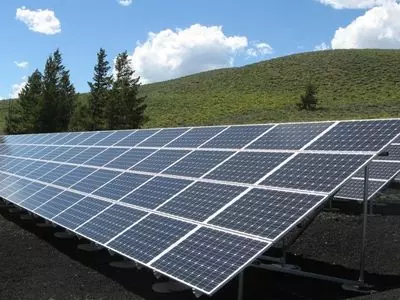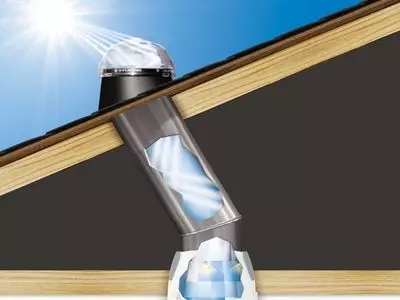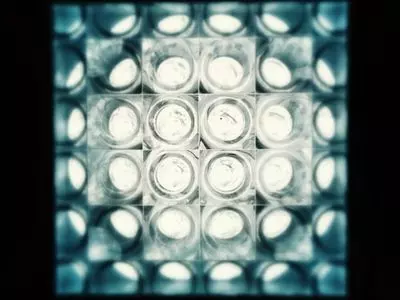Solar tubes, also known as sun tunnels, harness light from the sun and illuminate buildings in an eco-friendly manner, reducing electricity costs and carbon emissions.
So how do solar tubes work exactly?
Solar tubes work by capturing sunlight and bouncing that light off of the highly reflective inner surface of the tube.
The reflected light is transferred through a diffuser which then produces natural interior lighting.
If you’re looking to shrink your carbon footprint, save money on your electricity bill, or install a natural light source in your home, we answer all your solar tube questions.
What is a Solar Tube?

Solar tubes are tunnels made of highly reflective material.
Sunlight is captured by the tube and reflected through the tunnel and into your home.
Solar tubes are most effective when they are 25 feet in length or less.
The shorter and straighter your sun tunnel, the more light that will be provided.
This could potentially pose a challenge for homeowners with particularly high ceilings or large attics.
Do Solar Tubes Really Work?
Solar tubes provide a strong and consistent source of natural light by channeling sunlight into your home.
These tubes are known for their reliability and you will not have to worry about a leak in your roof with a solar tube.
This cannot be said for traditional skylights which are notorious for leaking.
How do Solar Tubes Light Up a Room?
Solar tubes work in a similar way to a traditional skylight.
However, solar tubes provide more natural light than skylights and are easier to install.
Sunlight from solar tubes is emitted into your home through a lighting fixture, usually an acrylic dome or plate, which then diffuses the natural light through the room.
Take a look at this video from This Old House on all things solar tubes:
How Long Does a Solar Tube Last?
In ideal conditions, solar tubes can last permanently.
That said, in most cases, they will probably need to be replaced at some point due to wear and tear.
Due to the top portion of the tube being exposed to the outdoors, it could be damaged by strong winds or precipitation.
It’s reasonable to assume your solar tube will last multiple years, but you should be aware that unfortunate weather conditions could compromise your solar tube.
Can Solar Tubes be Turned On and Off?
Most solar tubes cannot be turned on or off.
However, some newer solar tubes, such as those from Solatube, do have dimming technology.
These dimmers allow you to control how much natural light comes through the sun tunnel during daylight hours.
What are the Drawbacks of Solar Tube Lighting?
While solar tubes offer a wide array of benefits, they do come with some minor drawbacks you should be aware of.
So, what are the drawbacks to solar tube lighting?
These drawbacks include:
- Unable to work in some homes
- Cannot be turned off
- Less decorative appeal than traditional lighting
- Dependent on weather
Types of Solar Tubes

There are two main types of solar tubes: flexible tubes and rigid tubes.
Each tube type is best suited for a different situation.
Rigid tubes are straight tunnels that provide the most light, but flexible tubes are more adaptable and are good for compact spaces.
Solar Tube Installation
Solar tubes can be installed by homeowners and professional contractors alike.
Installing a solar tube is a day project that does require some basic carpentry and construction skills.
How Long Does it Take to Put in a Solar Tube?
Installation times for solar tubes can vary, but they can almost always be installed within 1 day.
Experienced do-it-yourself renovators should be able to install a solar tube over the course of 2 or 3 hours.
Be prepared to cut out portions of both your ceiling and roof in order to install a solar tube.
This process will take up the bulk of the installation time for this project.
You will need to be comfortable working on your roof and in your attic (if you have one) if you plan on installing your solar tube by yourself.
If this does not sound reasonable to you, hiring a professional contractor is always an option, although it will be more expensive.
Where Do I Put Solar Tubes?
The top of the tube needs to run through your roof but other than that, placement is up to you as solar tubes are effective in most areas of the house.
Popular locations for solar tubes include:
- Bathrooms
- Hallways
- Laundry rooms
- Finished attic spaces
Do Solar Tubes Work at Night?

Solar tubes themselves do not work at night because they need sunlight to function.
However, many homeowners who have installed solar tubes also make use of solar nightlights.
Solar nightlights are small devices that can be installed within a solar tube.
The nightlight charges during the day by collecting solar energy and in turn, powers the nightlight to illuminate the solar tunnel at night.
Solar Tubes with Electric Light
Solar tubes can be used in combination with electric lighting.
Many homeowners with solar tunnels and electric lights will make use of the natural light during daytime hours with electric lighting only switching on after the sun has set.
This allows homeowners to enjoy some of the reduction in electric bills that solar tunnels provide while also still enjoying the benefits of electric lighting.
Do Solar Tubes Work in Winter?
Solar tubes will work in winter as long as there is sunlight.
This means that because the days are shorter during the winter, the time your solar tube will be effective is also shorter.
Do Solar Tubes Let Heat In?
Solar tubes will not heat up a room.
But, if you were to stand directly under the solar tube’s light on a sunny day, you would hardly feel the sun’s warmth.
This also means that heat will not escape from your home through the sun tunnel during the winter.
Are Solar Tubes Worth It?
Moving from traditional electric lighting to the natural lighting provided by solar tubes is a big change.
Many may wonder if the benefits of solar tubes are worth making the switch away from electric lighting.
Here are a few financial factors to consider that may help you decide if solar tube lighting is the best option for you.
What Does it Cost to Put In a Solar Tube?
The average cost for a professionally installed solar tube is $750.
Prices can fluctuate based on the specifics of your situation but you should expect to pay between $500 and $1,000 for a new sun tunnel.
Factors that contribute to the cost of solar tubes include:
- Labor costs
- Parts and materials
- Installation and construction
Are Solar Tubes Tax Deductible?
Most solar tubes will not earn you any tax benefits.
However, there is one specific solar tube that has recently become eligible for a tax credit.
The Solatube Daylighting System is eligible for a 26% Federal Tax Credit.
In order to claim the credit you will need to file the cost of installation on your IRS 5695 Form.
There is no cap on this tax credit.
This means that multiple solar tubes will earn you multiple credits on your tax return.
FAQs
Here are the answers to some common questions about solar tubes.
Are Solar Tubes Noisy?
No, solar tubes do not make any noise.
However, some solar tubes include additional reflectors that are placed on the roof.
Windy conditions can cause these reflectors to make an irritating noise.
Can you Grow Plants with Solar Tubes?
Yes, solar tubes create an effective environment for growing plants indoors.
Those looking to keep their plants safe from bad weather or pests often make use of solar tube lighting.
Which are Better: Solar Tubes or Solar Panels?
Solar tubes and solar panels largely serve different purposes.
The main purpose of solar tubes is to provide interior lighting while solar panels are used to generate and store electricity.
In terms of financial incentives, tax credits are much more widely available for solar panels compared to solar tubes.
Check out this article on solar energy pros and cons for more on the benefits of solar energy products.
Conclusion
Solar tubes are a great option for those looking to add a source of natural light to their home.
Beyond just the benefits of natural lighting, solar tubes will also save you money on your electric bill and potentially earn you a tax credit.
Compared to skylights, solar tubes are easier to install and are more reliable when it comes to heat and water leaks.
Solar tubes are also a perfect eco-friendly way to light up your home in a way you have never experienced before.

